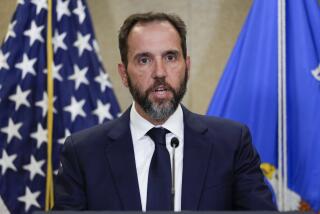No Special Counsel on Enron
- Share via
The fast developing Enron story has now reached Washington scandal status.
Adding to the frenzy, some Democratic leaders sound as though they regret the demise of the independent counsel legislation, something most of them applauded when it happened in 1999. If that legislation had not expired, these critics would have been able to demand that the Bush administration request an independent counsel and then make political hay when the administration refused. This would have been reminiscent of the Republican onslaught against Atty. Gen. Janet Reno for refusing to request an independent counsel to investigate charges of campaign financing misdeeds in the 1996 Clinton campaign.
Instead, the critics can only call for the Justice Department to appoint a special counsel. Yet on the basis of the facts known so far, this would be wrongheaded and inconsistent, nothing more than a return to the familiar partisan political game of “gotcha!”
Enron’s collapse may indeed justify investigations by Congress, the Securities and Exchange Commission and the Justice Department, all of which are underway.
The attorney general and his chief of staff have properly recused themselves because of political contributions made by Enron, and a special Justice task force has been created to conduct the investigation.
There appears to be no reason that the professional prosecutors on this task force cannot be trusted to be objective and thorough.
Then what was the necessity for past independent counsels, which Congress legislated after the Watergate scandal?
That legislation never was intended to replace the Justice Department as the official law enforcement arm of the federal government; Congress could not constitutionally do this. Rather, the independent counsel legislation was aimed at the rare circumstance in which an attorney general would be faced with a serious conflict of interest in having to investigate substantial and credible criminal charges against the president or a high Cabinet official.
In Watergate, exactly such a conflict existed for Atty. Gen. Elliot L. Richardson when criminal charges were pending against President Nixon’s top staff and former Cabinet members, charges that implicated the president. At the time, Richardson appointed a regulatory special prosecutor, Harvard law professor Archibald Cox. Only after Nixon fired Cox did the Senate Watergate Committee conclude that new legislation was needed.
I believe this legislation worked well from 1978 to the mid-1980s. It was used sparingly and had the confidence of the public. But beginning with the Iran-Contra investigation and through the numerous investigations involving the Clinton administration, it was overused. It became publicly and politically unpopular and so was not reenacted by Congress.
So far, nothing made public about Enron would have justified the appointment of an independent counsel. There are no charges that President Bush, Vice President Dick Cheney or any member of the Cabinet had complicity in Enron’s financial failure. Yes, Enron Chairman Kenneth L. Lay was a major financial supporter of Bush and thus had access to the president and Cabinet members. But such access has always been an inherent feature of the American political system. With no evidence of improper favors, it is at most an impropriety. The remedy is campaign financing reform.
The administration has disclosed that in October, just as Enron was going under, Lay contacted Treasury Secretary Paul H. O’Neill and Commerce Secretary Don Evans and may have asked for help in protecting Enron’s credit rating. But it seems that no such help was given. Apparently, the administration did nothing to prevent the company’s financial failure and the resulting losses to shareholders and employees. It is not clear what the administration could have done, even in October. But if anyone in the administration had intervened to save Enron, the critics would now be making even more serious allegations. The investigations should go forward without a supplemental independent investigator. With regard to possible criminal charges, the Justice task force should conduct an aggressive investigation. The accounting practices used to falsely report huge profits, misleading investors and employees, need to be exposed and those responsible made accountable.
The congressional and SEC investigations must thoroughly examine the role of corporate directors, auditors and large accounting firms to determine whether outside audits are truly independent.
Tragic as it is to so many investors and employees, Enron’s failure could serve as a wake-up call for American politics and business.
More to Read
Get the L.A. Times Politics newsletter
Deeply reported insights into legislation, politics and policy from Sacramento, Washington and beyond. In your inbox twice per week.
You may occasionally receive promotional content from the Los Angeles Times.










